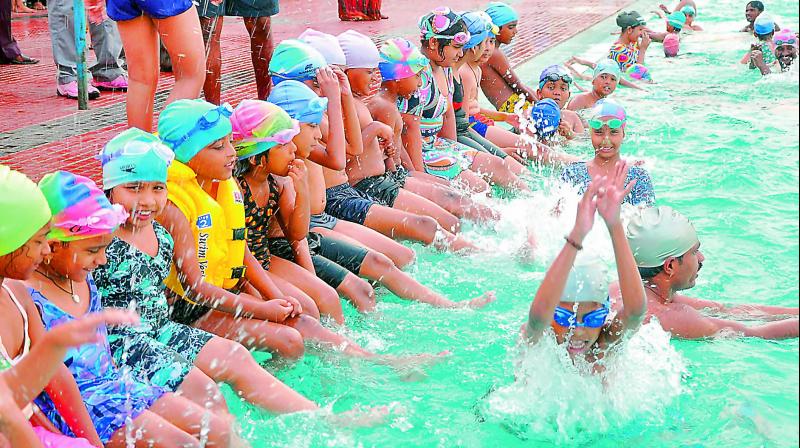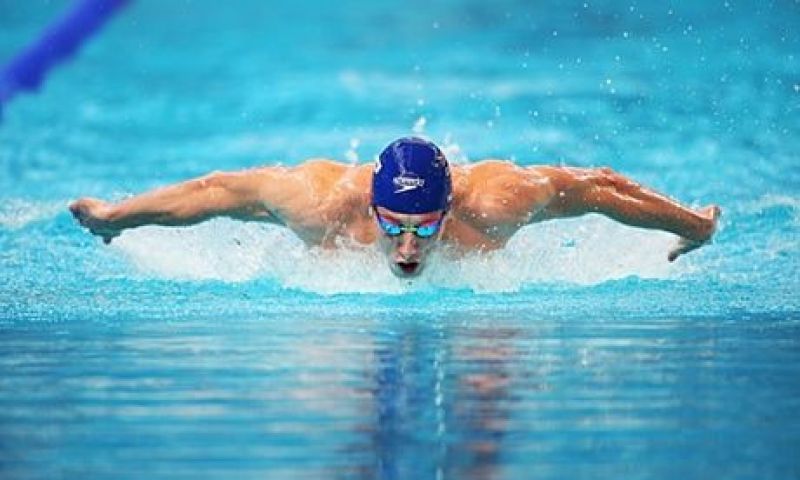Safety first, take tips before swimming
The beginners are unaware of dive techniques, depth of the pool.

Hyderabad: Absence of supervision at swimming pools is the prime cause of deaths, especially for those learning swimming or are new to this. The ratio of amateurs to the coaches is almost 30:1 in a majority of the pools, and all the deaths reported are caused due to negligence.
The beginners are unaware of dive techniques, depth of the pool. Even before they learn the techniques, they’re eager to get to the deeper end without supervision. Swimming is no easy game, but needs training for at least for first 15 days, until the basic strokes are learnt, say experts.
It is mainly during the summer season the rush at government and private swimming pools is high. The intake is higher than the required manpower.
Mr. John Siddiqui, a qualified coach and director of Zion club said, “A majority of the pools want to make money with large in takes without having proper manpower (life guards). Many don’t have separate programmes for swimmers and non-swimmers. The first class for a beginner is not about strokes, but about life-saving skills.”
 Note: When not used, a private swimming pool should be properly fenced and covered. Additionally, alarms should be installed that detect when the fence gate is opened or the water is disturbed without authorisation.
Note: When not used, a private swimming pool should be properly fenced and covered. Additionally, alarms should be installed that detect when the fence gate is opened or the water is disturbed without authorisation.
One should be taught what to do when they panic or water enters their mouth. People shouldn’t take swimming for granted. First practise in the non-deep areas and then move forward. Beginners should never go to the deeper end along the length. There should be no play as it is a serious sport.
Every pool needs certified coaches, safety equipment and life guards. For every 50 members, there should be eight life guards. Beginners should be allowed to jump into the pool at deeper ends.
G. Umesh, a GHMC-certified-coach added, “All swimming pools must have life-saving equipment – life buy, stick and ring buy. Coaches should be trained in safety and lifesaving-techniques in a situation of panic. It would be better if they are trained from the National Institute of Sports. Most importantly, the management should place a rope to divide the deep area. The pools should have the marks of the depth.”
Deaths
- 2016: 19-year-old youth Mohd Rizwan Khan drowned in a swimming pool in Yakatpura. The investigation revealed that the youth died after suffering a head injury in the six-and-a-half feet deep pool.
- Class VIII student D. Yashwanth, a resident of Gudimalkapur, drowned in a swimming pool. It so happened that the boy and his friends entered the eight-feet deep pool without supervision. A few minutes after that, he drowned.
2017: A 14-year-old boy, Harish, who didn’t know swimming, drowned in a swimming pool at Gajularamaram of Jagadgirigutta within a few minutes of entering it.
Alert while entering pools
Do’s
- Always follow the lifeguard’s directions. The coach knows better.
- Walk along the sides of the pool, don’t run. In particular, children often run and are at a greater risk of breaking a limb, slipping on the wet ground.
- Wear a swim cap (long hair). This avoids situations like the pool’s filters getting clogged or people cut themselves on a hair when they dive off from a starting block.
- Wear your swim suit at the pool. Don’t go to the pool with a suit or shorts that you have worn all day.
- The coach should be trained in CPR (Cardiopulmonary Resuscitation).
- If you go to the pool with a toddler, make sure that they wear waterproof diapers
Dont’s
- Never let children swim without supervision, even for a few moments.
- Don’t allow children to dive in the shallow end of the pool or without proper supervision. Diving boards and other structures are especially dangerous.
- Avoid swimming underwater while holding your breath, especially after hyperventilating. This can lead to shallow water blackout and drowning.
- For beginners, don’t dive without proper supervision by an experienced swimmer or coach. Diving should always be done in the deep end of the pool, not in the shallow end or somewhere in between.
- Don’t go to the pool with a suit or shorts that you have worn all day.
- Don’t enter the pool being dirty. Always shower off first.

